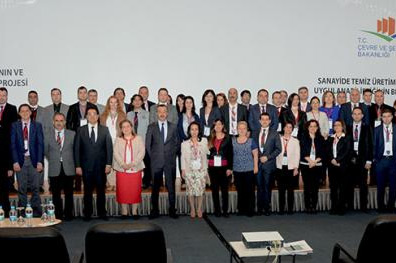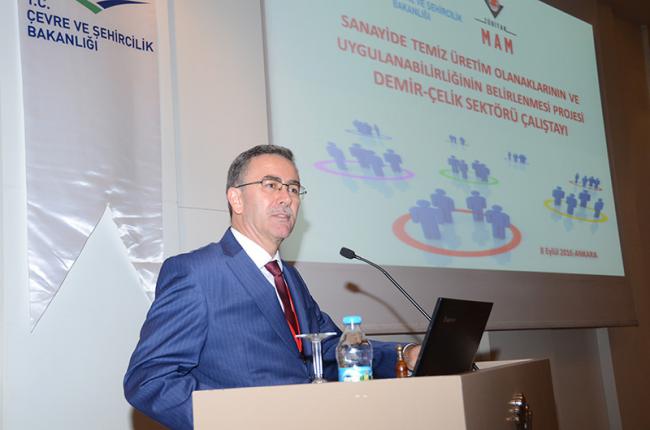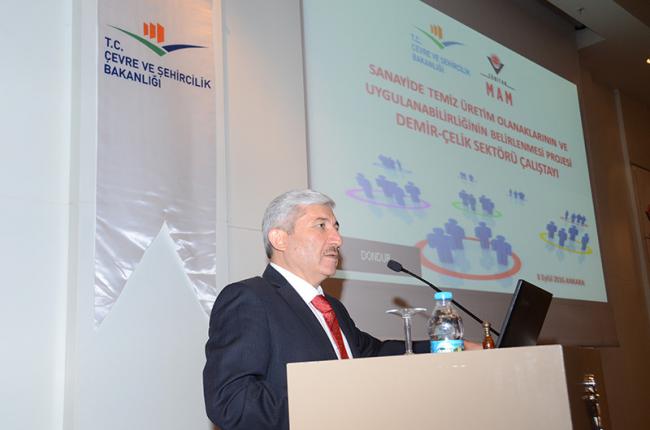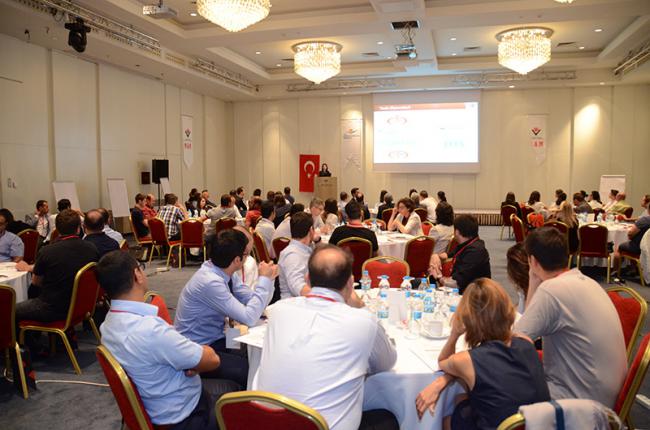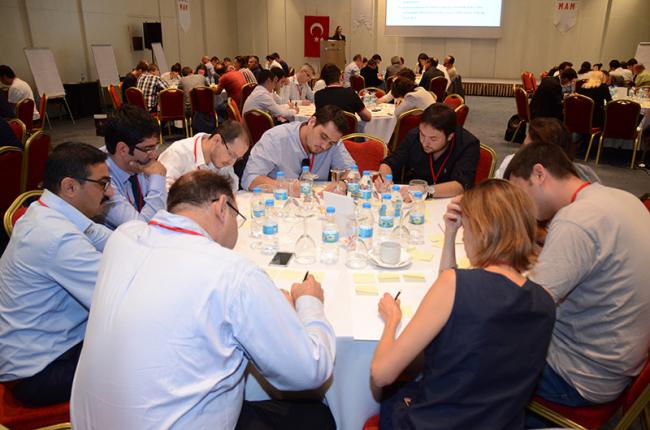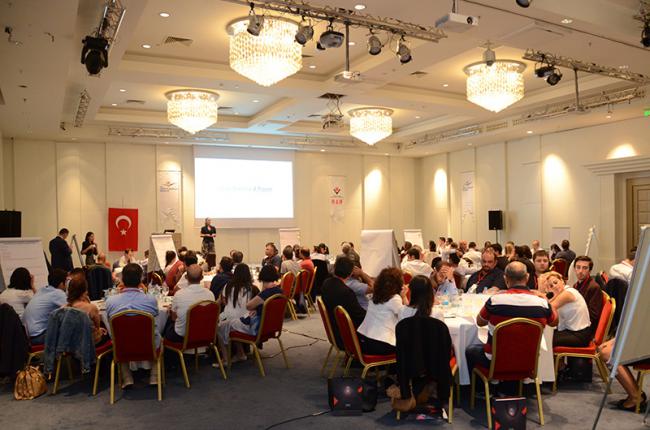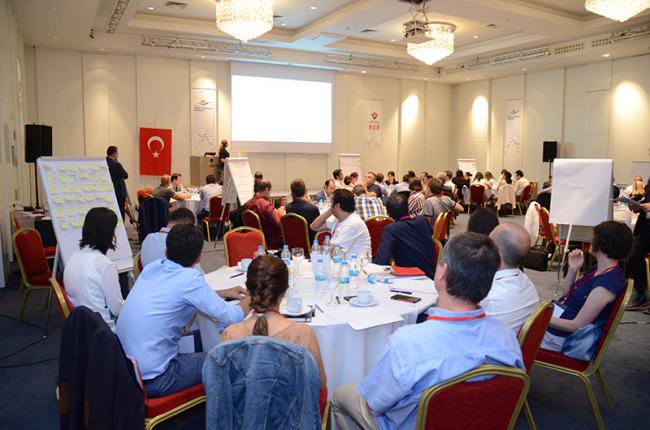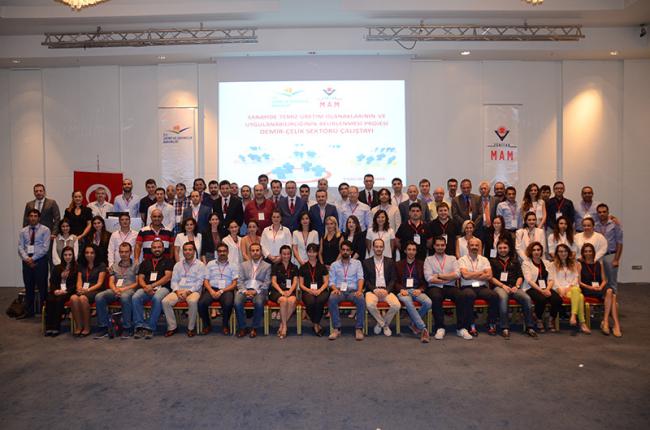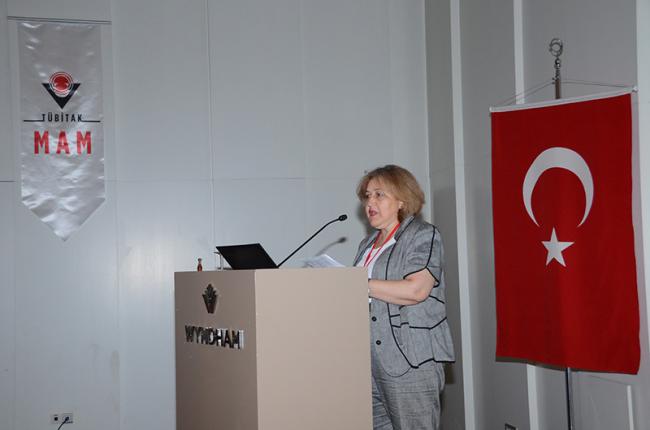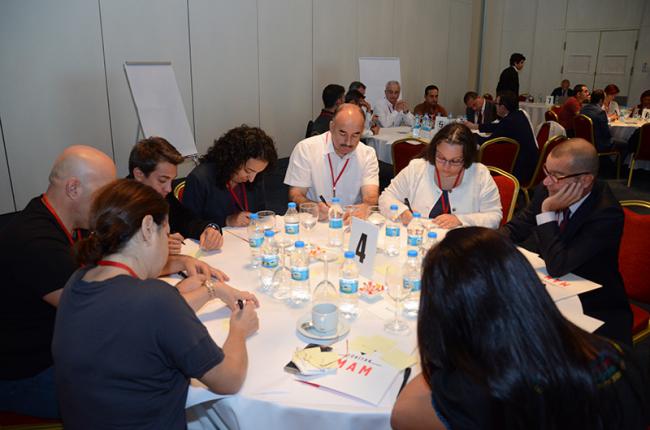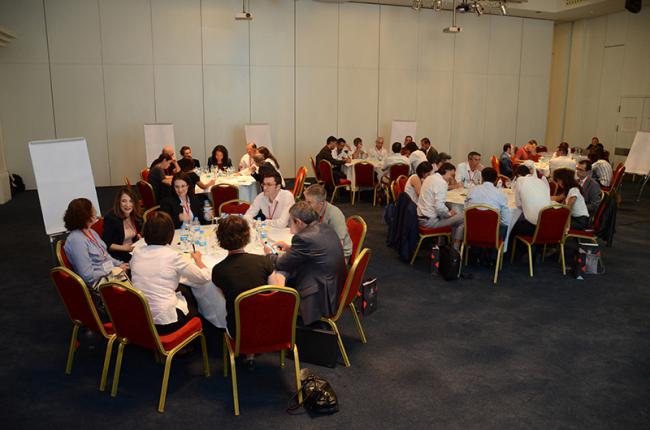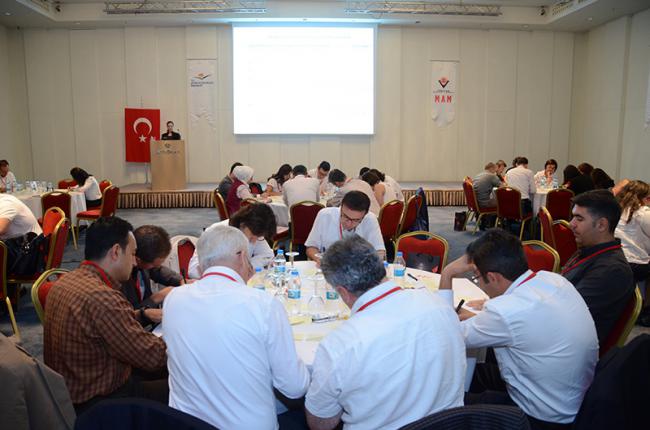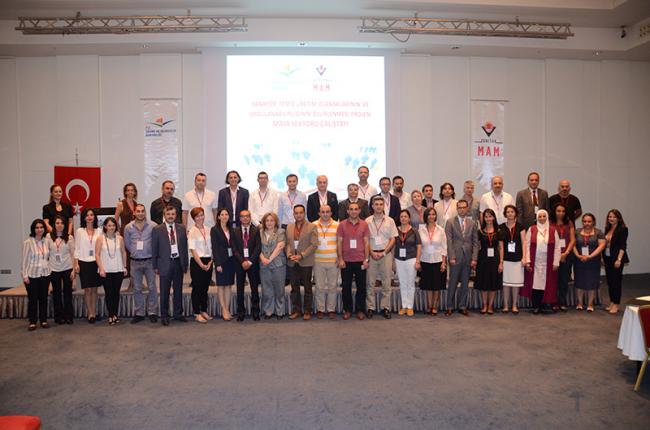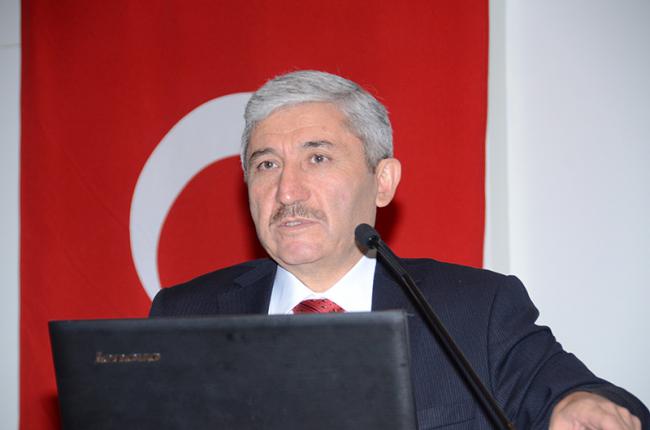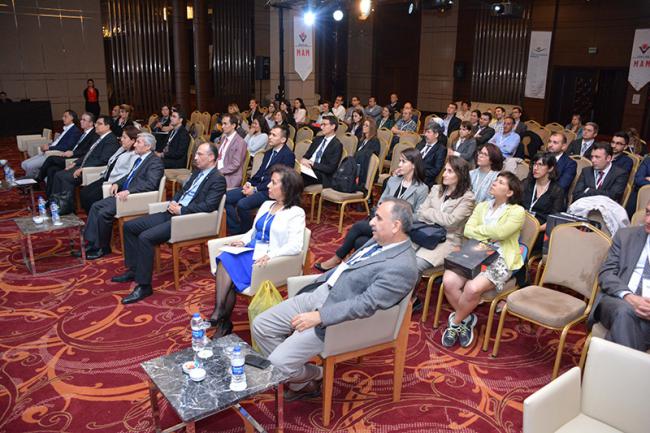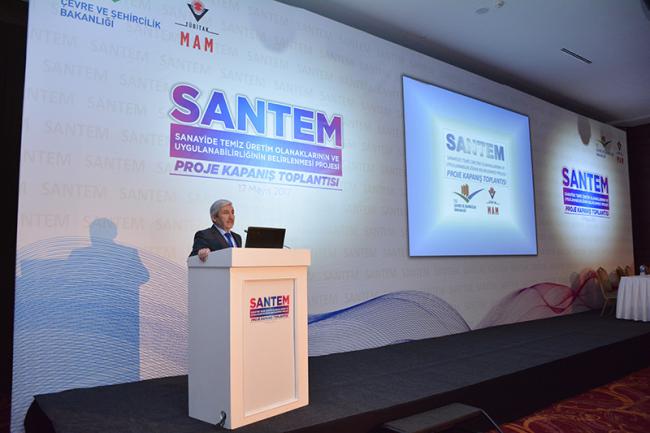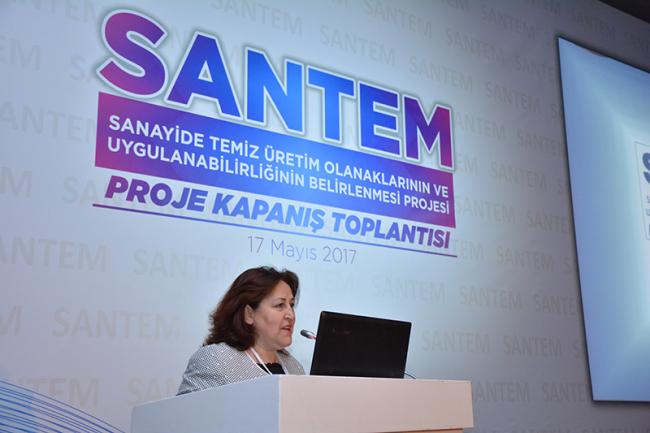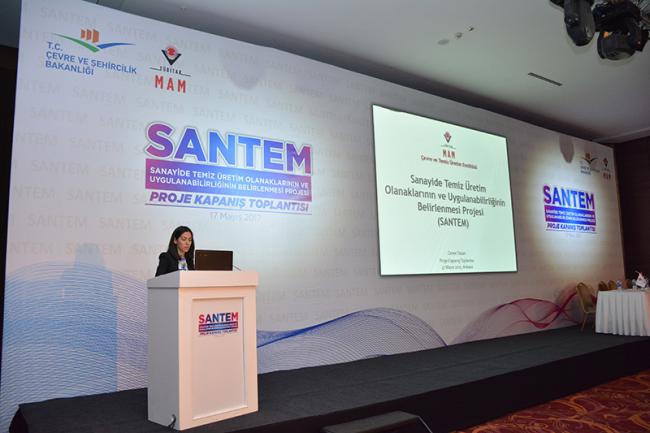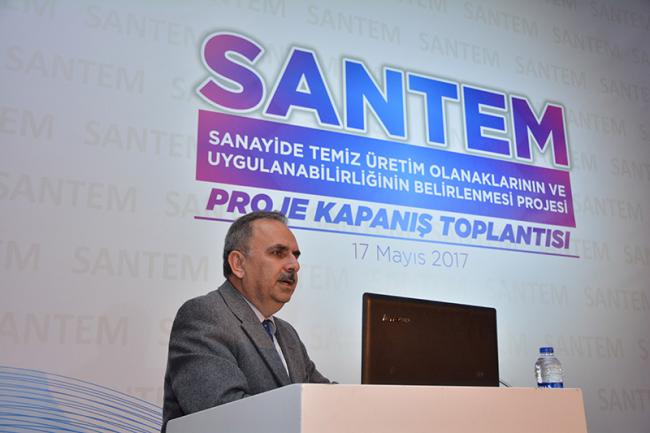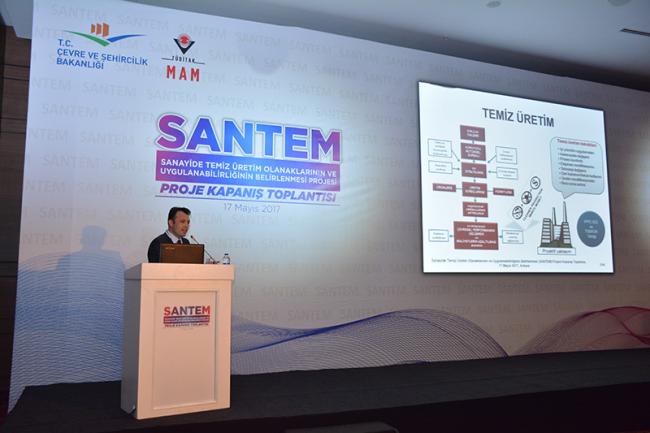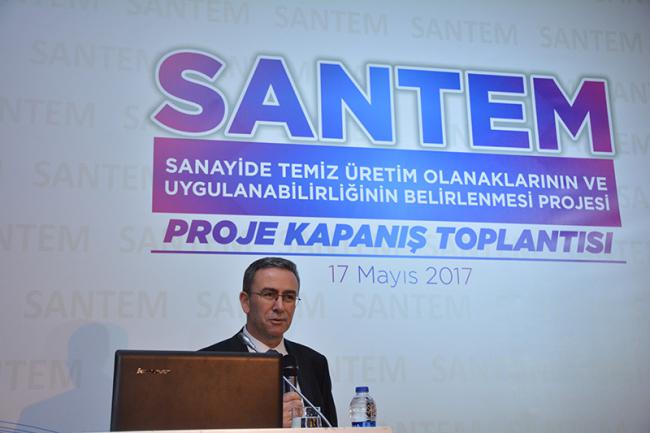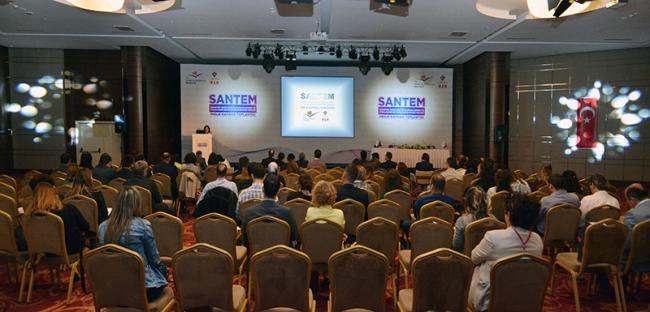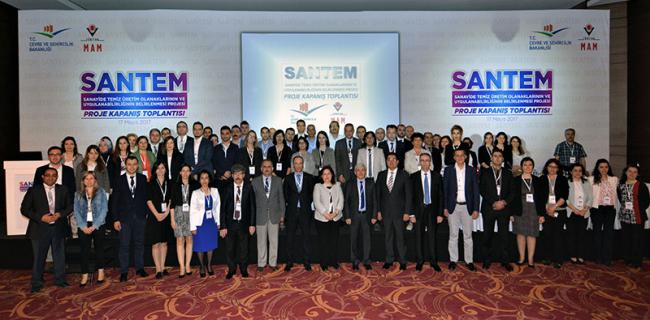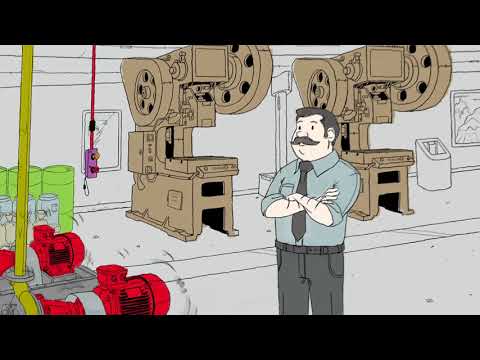Project on the Identification of Cleaner Production Opportunities and Application (SANTEM) in the Industry
“Sanayide Temiz Üretim Olanaklarının ve Uygulanabilirliğinin Belirlenmesi (SANTEM)” Projesi, Çevre ve Şehircilik Bakanlığı Çevre Yönetimi Genel Müdürlüğü adına TÜBİTAK Marmara Araştırma Merkezi tarafından yürütülmüştür. Mart 2016’da başlayan proje, Aralık 2016’da tamamlanmıştır.
SANTEM Projesi’nde demir-çelik ve maya sektörlerinin mevcut durumu, sektörel ihtiyaçlar, temiz üretim olanakları, teşvik mekanizmaları ve yasal düzenlemeler incelenerek, belirlenen çeşitli olanakların ülkemiz koşullarında uygulanabilirlikleri değerlendirilmiştir. Proje kapsamında gerçekleştirilen faaliyetler ve proje çıktıları aşağıda özetlenmiştir.
Mevcut Durumun Belirlenmesi iş paketi, literatür inceleme ve derleme çalışması ile tesis ziyaretlerini içermektedir. Bu kapsamda maya ve demir-çelik sektörleri için Türkiye’de ve dünyada uygulanan temiz üretim olanakları ve konu ile ilgili yürürlükte olan ulusal ve uluslararası mevzuat ve uygulamalar incelenmiştir. Literatür inceleme ve derleme çalışmaları sırasında öncelikle “Entegre Kirlilik Önleme ve Kontrolü Direktifi” kapsamında hazırlanmış olan sektörel Mevcut En İyi Teknikler (MET) referans dokümanlarında yer alan sektörel teknik/teknolojiler incelenmiş, prosesler özelinde spesifik üretim ve tüketim değerlerine ulaşılmıştır. Her iki sektörde tesis ziyaretleri gerçekleştirilmiş, prosesler yerinde incelenerek firmalarda gerçekleştirilen kaynak verimliliği ve çevresel performansların geliştirilmesine yönelik uygulamalar hakkında bilgi temin edilmiştir. Bu kapsamda, maya sektöründe ekmek mayası üretimi yapan Pak Gıda Üretim Pazarlama A.Ş. İzmit Fabrikası ve bira mayası üretimi yapan Anadolu Efes A.Ş. İzmir Fabrikası, demir-çelik sektöründe ise, Bilecik Demir Çelik San. ve Tic. A.Ş., ÇEMTAŞ Çelik Makina Sanayi ve Tic. A.Ş., İskenderun Demir ve Çelik A.Ş. ve Ereğli Demir ve Çelik Fabrikaları T.A.Ş. ziyaret edilmiştir.
TÜBİTAK's Marmara Research Center conducted the Project on the Identification of Cleaner Production Opportunities and Application (SANTIEM) in the Industry on behalf of the Directorate General of Environmental Management of the Ministry of Environment and Urban Planning. Starting in March 2016, the project was completed in December 2016.
SANTEM Project examined the current status of the iron, steel and yeast sectors, sector needs, cleaner production facilities, incentive mechanisms and legal regulations. Also, it assessed the applicability of various possibilities in Turkey’s circumstances. The project activities and relevant outputs are summarized below.
The work package of Determination of Current Situation includes compilation, literature review and on-site visits. In this context, national and international cleaner production means in yeast and iron, and steel sectors and applicable national and international legislation and practices were examined. As part of the literature review and compilation activities, the first step included the examination of sector techniques/technologies in the sector-specific Best Available Techniques (BAT) reference documents prepared under the "Integrated Pollution Prevention and Control Directive." It led to process-specific production and consumption values. On-site facility visits were paid to both sectors; the processes were examined on site to obtain information on practices applied by the companies to improve their resource efficiency and environmental performance. Accordingly, Pak Gıda Üretim Pazarlama A.Ş.’s İzmit Factor, bread yeast producer in yeast sector, and Anadolu Efes A.Ş.’s İzmir Factory, a beer yeast producer, and Bilecik Demir Çelik San. ve Tic. A.Ş., ÇEMTAŞ Çelik Makina Sanayi ve Tic. A.Ş., İskenderun Demir ve Çelik A.Ş. And Ereğli Demir ve Çelik Fabrikaları T.A.Ş. were visited in the iron and steel sector.
The work package of Cleaner Production Audit in Pilot Facilities includes the identification of pilot plants, data collection, and cleaner production audits. Pilot facilities were selected among the companies to which on-site visits were paid. Activities were conducted in Izmir factory of Pak Gıda Üretim Pazarlama A.Ş. (yeast sector), İskenderun Demir ve Çelik A.Ş., an integrated iron and steel plant (iron&steel sector), ÇEMTAŞ Çelik Makina Sanayi ve Tic. A.Ş., a steel producer with electric arc furnace and Bilecik Demir Çelik San. ve Tic. A.Ş., which is involved in melting with induction furnaces. These activities, in summary, include data collection from facilities, analysis and evaluation, determination of specific input and output quantities and the creation of mass-energy equations based on production processes, determination of areas open to improvement, wastewater characterization activities and suggestions on how to manage wastes and wastewater generated in the facilities.
As part of the Draft Legislation Work and Regulatory Impact Analysis work package, a draft legislation work was conducted for the yeast and iron and steel sectors to minimize the negative effects of the sector activities on the environment, to ensure the environment-friendly management of the enterprises and to arrange the procedures and principles for the use of cleaner production technologies.
Three scenarios were assessed in the Regulatory Impact Assessment (RIA) study to estimate the economic, environmental and social impacts with the implementation of cleaner production practices to be defined in the draft legislation.
As part of the work package "Organization of Sector Workshops,” "Workshops for the Determination of Sector Requirements" were organized for the Yeast Sector on September 7, 2016, and for the Iron and Steel Sector on September 8, 2016, to minimize the negative effects of sector activities determined as part of the project works, to assess solution proposals to the difficulties that may arise during the implementation phase of possible cleaner production technologies and methods, and to prioritize sector-specific cleaner production opportunities. The workshops featured technical, financial and legislative sessions. The first part of the two-stage workshops included the creation of round-table ideas and prioritization work regarding the "Determination of Methods and Strategies for Cleaner Production Activities." Also, the incentives and financial model proposals to implement and disseminate sector-specific cleaner production practices and the economic, social and environmental impacts of sector-specific legal arrangements were evaluated in line with stakeholder views. In the second part, the lists of Best Available Practices (BAT) prepared in line with pilot facility studies and literature review were presented to the participants for assessment in four categories - technical feasibility and sustainability, economic viability and sustainability, benefits from implementation and environmental gains - to prioritize cleaner production facilities on a sector basis.
A Management Plan Report was prepared for both sectors on the basis of the workshop outputs. This report presented the strategies, targets, and activities identified to improve the factors that adversely affect cleaner production activities and disseminate efficiency practices.
The Benefit&Cost Analysis work package included the examination of the feasibility of cleaner production techniques prioritized in sector-sector-specific workshops. Also, it revealed economic effects, investment requirements, payback periods and annual earnings.
A Cleaner Production Guide in the Iron and Steel Industry and a Cleaner Production Guide in the Yeast Sector were prepared to guide the sector stakeholders applying the best available techniques. The documents compiled on-site visits in the pilot plants, literature reviews and the current state of the sectors based on research, production processes, and cleaner production opportunities.
For detailed information about the project, ceren.tosun@tubitak.gov.tr; aysegul.avinal@tubitak.gov.t
The Opening Meeting of the Project on the Identification of Cleaner Production Opportunities and Application in the Industry
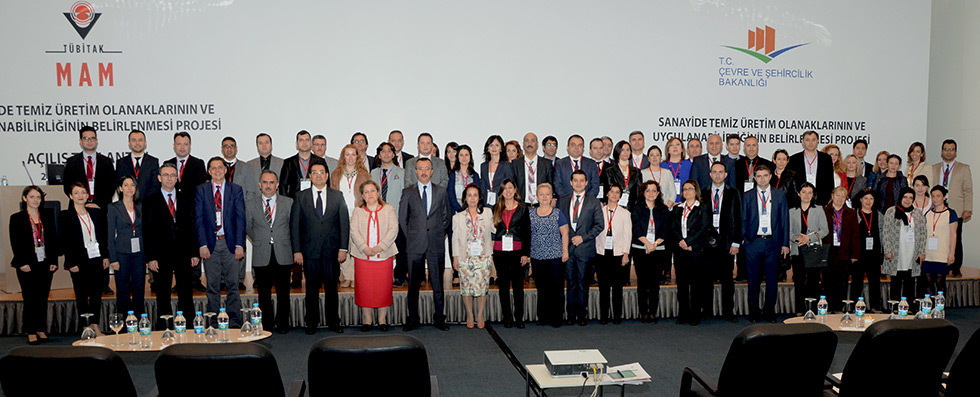
The Project on Determination of Cleaner Production Opportunities and Applicability (SANTEM) was signed between the Directorate General of Environmental Management of the Ministry of Environment and Urban Planning and TÜBİTAK Marmara Research Center on March 11, 2016. The Opening Meeting was held at Wyndham Hotel in Ankara on April 22, 2016.
Sebahattin Dökmeci, Deputy General Director of the Directorate General of Environmental Management, emphasized that cleaner production has a major role in terms of taking preventive and protective measures to stop air, water, and soil pollution, that the Ministry took its first concrete step in 2011 for the textile sector by issuing "Communiqué on Integrated Pollution Prevention in the Textile Sector," and they supported the SANTEM project to spread cleaner production practices to other sectors. Mr. Dökmeci stated that it is necessary to ensure the continuation of the projects such as SANTEM, which makes use of sector-specific cleaner production opportunities as they have an effect on reducing product cost in addition to preventing pollution at source.
Dr. Selma Ayaz, Director of Environment and Cleaner Production Institute, introduced the institution and provided information on the projects and cleaner production activities conducted. In her speech, Project Coordinator Ceren Tosun stated that they aimed to examine the current status of the iron, steel and yeast sectors, sector needs, cleaner production facilities, incentive mechanisms and legal regulations, and to assess the applicability of various possibilities in Turkey’s circumstances.
Supporting the project also as a consultant, Prof. Dr. Mehmet Kitiş explained how cleaner production was applied in enterprises, cleaner production activities in Turkey and their results referring to the importance of the project for the yeast and iron sectors. Assoc. Prof. Mustafa Türker, R&D and Environment Director of PAKMAYA, which will host pilot facility studies for the yeast sector as part of the project, and Ahmet Taşkın, Deputy Director of TÜBİTAK MRC Materials Institute, delivered presentations on the yeast sector and iron and steel sector, respectively.
They answered the questions from TÜBİTAK MRC Environment and Cleaner Production Institute’s project team and the Ministry officials during the panel at the end of the Opening Meeting.
The Opening Meeting was attended by representatives of the Ministry of Energy and Natural Resources, Ministry of Science and Industry and Technology, Ministry of Food, Agriculture and Livestock, Turkish Standards Institute as well as industry unions/associations, academics, representatives from various institutions and organizations, and iron and steel and yeast sector
The Workshop for the Determination of the Requirements in Iron and Steel Sector took place as part of the Project on Determination of Cleaner Production Opportunities and Applicability (SANTEM).
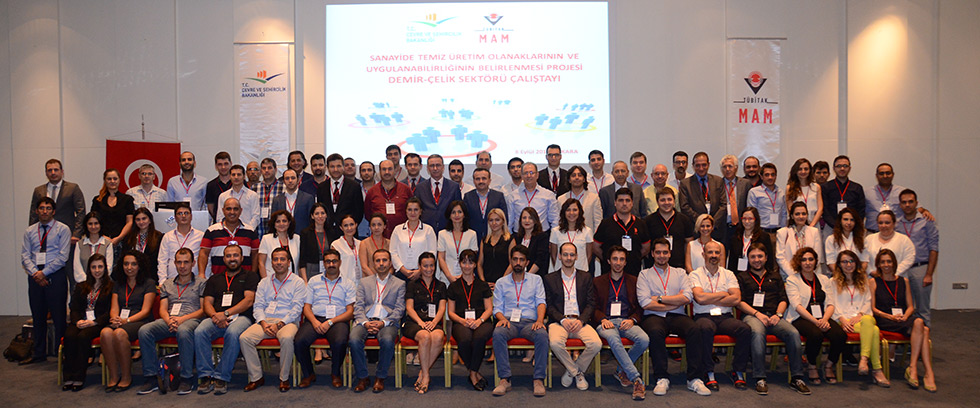
The Project on Determination of Cleaner Production Opportunities and Applicability (SANTEM) was signed between the Directorate General of Environmental Management of the Ministry of Environment and Urban Planning and TÜBİTAK Marmara Research Center on March 11, 2016. A “Workshop for the Determination of the Sector Requirements” in the iron and steel sector took place at Wyndham Hotel in Ankara on September 8, 2016.
The opening speeches by Ahmet Taşkın, Deputy Director of TÜBİTAK MRC Materials Institute and Recep Akdeniz, Deputy Director of the Directorate General of Environmental Management were followed by Project Coordinator Ceren Tosun’s presentation on project activities and the workshop targets.
After the presentations, the workshop featured round-table meetings to generate ideas on "Determination of Methods and Strategies for Cleaner Production Activities in the Yeast Sector" and "Prioritization of Cleaner Production Opportunities in the Yeast Sector." Round-table discussions put forward cleaner production requirements in the Turkish yeast sector and the ideas about action proposals for such requirement in a systematic way. The efforts to prioritize these options aimed at the evaluation of the sector-specific best available techniques.
The workshop was attended by a group of approximately 90 participants including the representatives of the Ministry of Science, Industry and Technology, Ministry of Economy, Ministry of Forestry and Water Affairs, Turkish Standards Institute as well as sector unions/associations, academics, representatives from various institutions and organizations, representatives of iron and steel sectors.
SANTEM project also features similar ongoing activities for the iron and steel and yeast sectors. The Project will examine the current status of the iron, steel and yeast sectors, sector needs, cleaner production facilities, incentive mechanisms and legal regulations. Also, it assessed the applicability of various possibilities in Turkey’s circumstances
The Workshop for Determination of the Requirements of the Yeast Sector took place as part of the Project on Determination of Cleaner Production Opportunities and Applicability (SANTEM).
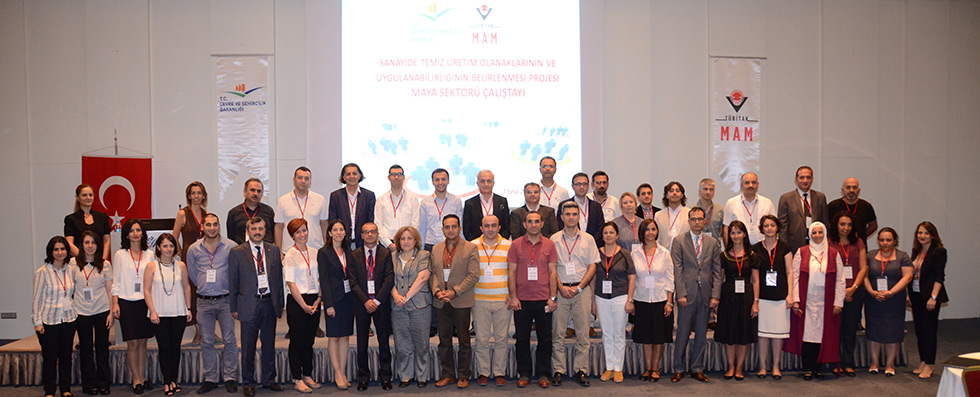
The Project on Determination of Cleaner Production Opportunities and Applicability (SANTEM) was signed between the Directorate General of Environmental Management of the Ministry of Environment and Urban Planning and TÜBİTAK Marmara Research Center on March 11, 2016. A “Workshop for the Determination of the Sector Requirements” in the yeast sector took place at Wyndham Hotel in Ankara on September 7, 2016.
The opening speeches by Dr. Selma Ayaz, Deputy Director of TÜBİTAK MRC Environment and Cleaner Production Institute, and Recep Akdeniz, Deputy Director of the Directorate General of Environmental Management were followed by Project Coordinator Ceren Tosun’s presentation on project activities and the workshop targets.
After the presentations, the workshop featured round-table meetings to generate ideas on "Determination of Methods and Strategies for Cleaner Production Activities in the Yeast Sector" and "Prioritization of Cleaner Production Opportunities in the Yeast Sector." Round-table discussions put forward cleaner production requirements in the Turkish yeast sector and the ideas about action proposals for such requirement in a systematic way. The efforts to prioritize these options aimed at the evaluation of the sector-specific best available techniques.
The workshop was attended by a group of approximately 60 participants including the representatives of the Ministry of Science, Industry and Technology, Ministry of Economy, Ministry of Forestry and Water Affairs, Turkish Standards Institute as well as sector unions/associations, academics, representatives from various institutions and organizations, representatives of the yeast sector.
SANTEM project also features similar ongoing activities for the yeast and iron and steel sectors. The Project will examine the current status of the iron, steel and yeast sectors, sector needs, cleaner production facilities, incentive mechanisms and legal regulations. Also, it assessed the applicability of various possibilities in Turkey’s circumstances
The Closing Meeting of SANTEM Project was held in Ankara
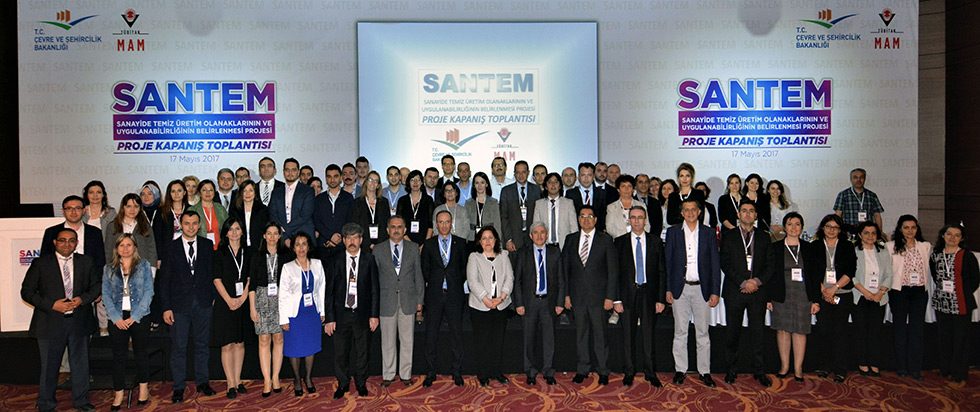
The Project on Determination of Cleaner Production Opportunities and Applicability (SANTEM) was signed between the Directorate General of Environmental Management of the Ministry of Environment and Urban Planning and TÜBİTAK Marmara Research Center on March 11, 2016. The Closing Meeting was held at Holiday Inn in Ankara on May 17, 2017. The Project aimed to examine the current status of the iron, steel and yeast sectors, sector needs, cleaner production facilities, incentive mechanisms and legal regulations, and to assess the applicability of various possibilities in Turkey’s circumstances.
Recep Akdeniz, Deputy Director General of the Directorate General of Environmental Management, made an opening speech on behalf of the Ministry of Environment and Urban Planning. He emphasized that cleaner production aimed for less use of water, energy, chemicals and raw materials in production and lower pollution formation saying that this approach would enable industrialists to produce in line with global norms and increase its competitiveness at the international level. Mr. Akdeniz reminded that cleaner production approach should be adopted by the Turkish manufacturing industry and applied in consultation to provide a highly competitive industry by using resources in the most efficient way by achieving environmental and economic gains. He stated that the SANTEM project financed by the Ministry enabled the preparation of guides to help the iron and steel and yeast sectors in cleaner production issues.
Dr. Selma AYAZ, Director of TÜBİTAK MRC Environment and Cleaner Production Institute, expressed the importance of spreading this project to other priority sectors after the yeast and iron and steel sectors with regard to the sector-specific regulations which, in addition to playing a major role in achieving targets, will facilitate spreading cleaner production activities in Turkey by effective implementation of the provisions stated in current legal arrangements. She also stressed that all stakeholders had serious responsibilities in creating a national platform for the assessment of slag, one of the biggest problems of the iron and steel industry, and implementing nationwide R&D activities for the reuse and recovery of slag and.
Following the opening speeches, the Cleaner Production Promotion Film prepared for the project was screened and then Project Coordinator Ceren Tosun made a presentation on the project activities and output. The program continued with the presentations of Dr. Emrah Öztürk from Süleyman Demirel University and Assoc. Prof. Mustafa Türker from Pak Gıda Üretim ve Pazarlama A.Ş. Dr. Emrah explained cleaner production audits and BAT identification activities, whereas Assoc. Prof. Türker provided information on cleaner production practices in the yeast and iron and steel sectors.
The Closing Meeting was attended by a wide group of participants including the representatives of the Ministry of Science, Industry and Technology, Ministry of Agriculture and Water Affairs, Ministry of Energy and Natural Resources, Ministry of Development, Ministry of Economy, Ministry of Food, Agriculture and Livestock, Turkish Standards Institute as well as sector unions/associations, academics, representatives from various institutions and organizations, representatives of the iron and steel and yeast sectors.

